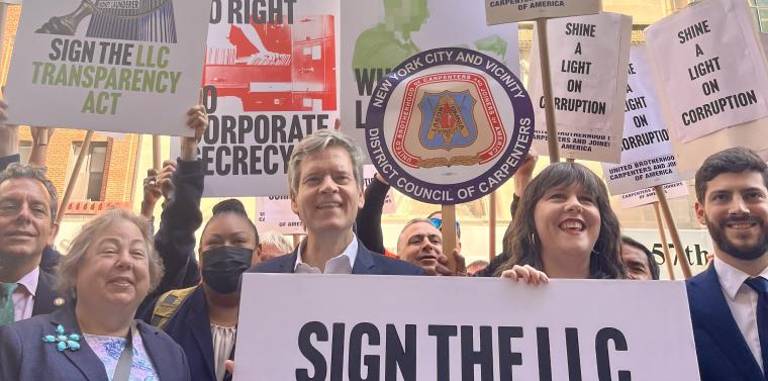Pols Ask Governor Hochul to Sign LLC Transparency Act
The bill, which intends to expose the “beneficial owners” of shell companies, is modeled after the federal Corporate Transparency Act. State Senator Brad Hoylman-Sigal and State Assembly Member Emily Gallagher–the lead sponsors for the legislation–rallied with allies outside Billionaire’s Row to urge Governor Kathy Hochul to sign the act into law.

A bill known as the LLC Transparency Act–which intends to expose the “beneficial” and anonymous owners of shell companies, foreign or domestic–is still sitting on Governor Kathy Hochul’s desk, awaiting her signature. At a September 27 rally headlined by State Senator Brad Hoylman-Sigal and State Assembly Member Emily Gallagher (the lead sponsors of the bill), a spate of political heavyweights sought to pressure the governor to enact the law.
Hoylman-Sigal and Gallagher represent the Upper West Side and Williamsburg, respectively. They tellingly speechified on the southern perimeter of Central Park, in front of Billionaire’s Row.
“Governor Hochul came into office promising a new era of transparency. This is her opportunity. Anonymous shell companies have cheated workers, abused tenants and violated the law. But sunlight is the best disinfectant,” Gallagher said.
“LLCs are past due for reform. It’s a farce that New York requires more information to get a library card than to set up a limited liability company. The anonymity and lax regulations around LLCs have allowed them to be exploited by international tax cheats, slumlords and shady employers to evade the law and rip-off the general public,” Hoylman-Sigal proclaimed.
“In response, the State Legislature overwhelmingly passed our LLC Transparency Act in June to assist law enforcement and regulators by creating a database of beneficial owners of LLCs, while also adding protections for significant privacy interests,” he concluded.
A memo summarizing Hoylman-Sigal’s sponsorship of the bill contains a “Justification” section, which clarifies the rationale for its passage: “Anonymous shell companies have been exploited as vehicles for money laundering, tax evasion, organized crime, terrorist financing, and other forms of corruption for decades. In the United States, the most common form of a shell corporation is the limited liability company (“LLC”). To form an LLC, a person needs less personal information than is required to obtain a library card.”
Holyman-Sigal’s office also pointed to a report (by the good-government nonprofit Reinvent Albany) indicating that 37 percent of Manhattan real estate is owned anonymously, which is five times the state average.
A “beneficial owner” of an LLC would be classified as somebody with a “membership” or controlling interest in the company. One prominent yardstick the bill would use to determine individual “control” is ownership stake in the LLC, particularly of at least twenty-five percent. If the individual retires such a stake in the company but still essentially retains control of the LLC, they will reportedly remain classified as a “beneficial owner.”
Such benchmarks would also apply to indirect control of the LLC, such as that exercised by a parent-subsidiary structure.
Significantly, “beneficial owners” do not include: a) minor children; b) certain people acting on behalf of “another person” (such as by being an agent, intermediary, or custodian); c) LLC employees that only “control” the economic benefits of the company by virtue of their employment there, i.e. people who receive no windfall from the LLC other than a salary and employee benefits; d) people who have a stake in the LLC via inheritance; and e) creditors that can’t be otherwise classified as beneficial owners.
“Beneficial owners” would have to provide their full legal name, date of birth, current street address, and government-issued identification to the New York Department of State. This would be a marked change of pace for foreign LLCs operating in the United States, who can currently use authorized third parties to identify themselves.
If the bill is signed, this information would be due by January 1, 2025.
The legislation appears to be pointedly modeled after the Corporate Transparency Act, a federal bill adopted in September of 2022 that will mandate similar reporting requirements for a variety of entities (including LLCs). That law is set to take effect on January 1, 2024. The New York bill would only apply to limited liability companies, as its name indicates.
In a sign that local law enforcement is itching to take advantage of the disclosures the bill would provide, Manhattan District Attorney Alvin Bragg wrote a letter supporting its signing. “Unscrupulous actors seeking to avoid their obligations and duties under both state and city law have weaponized the use of LLCs to obfuscate ownership with relative ease. As our office expands our white-collar work and focuses on wage theft and tenant harassment, enacting this legislation will particularly help facilitate and expedite these investigations,” it read in part.